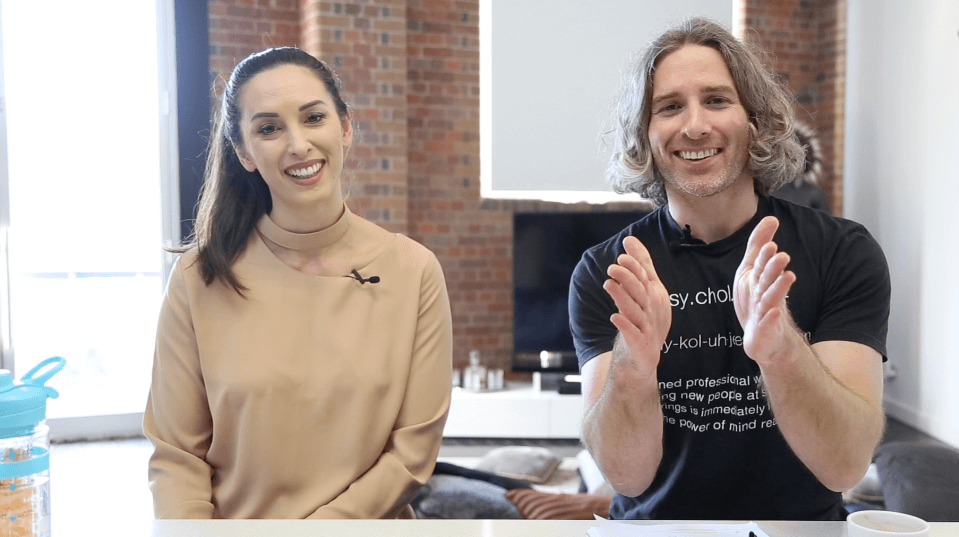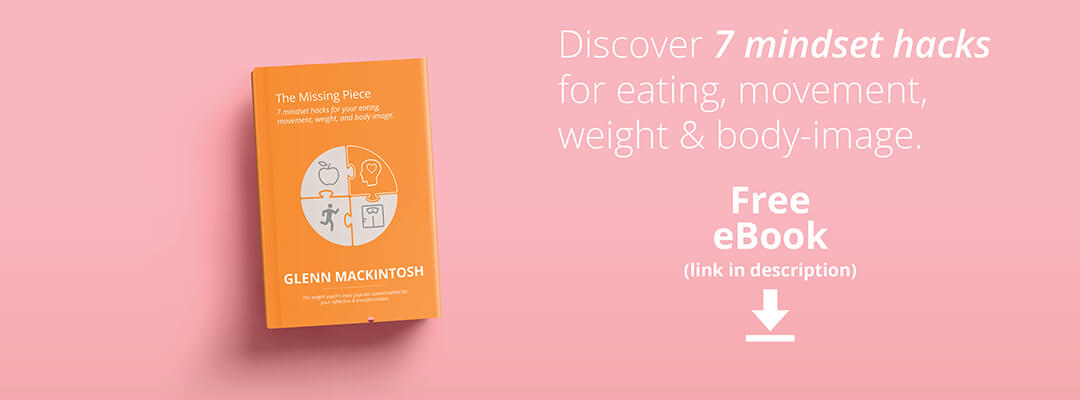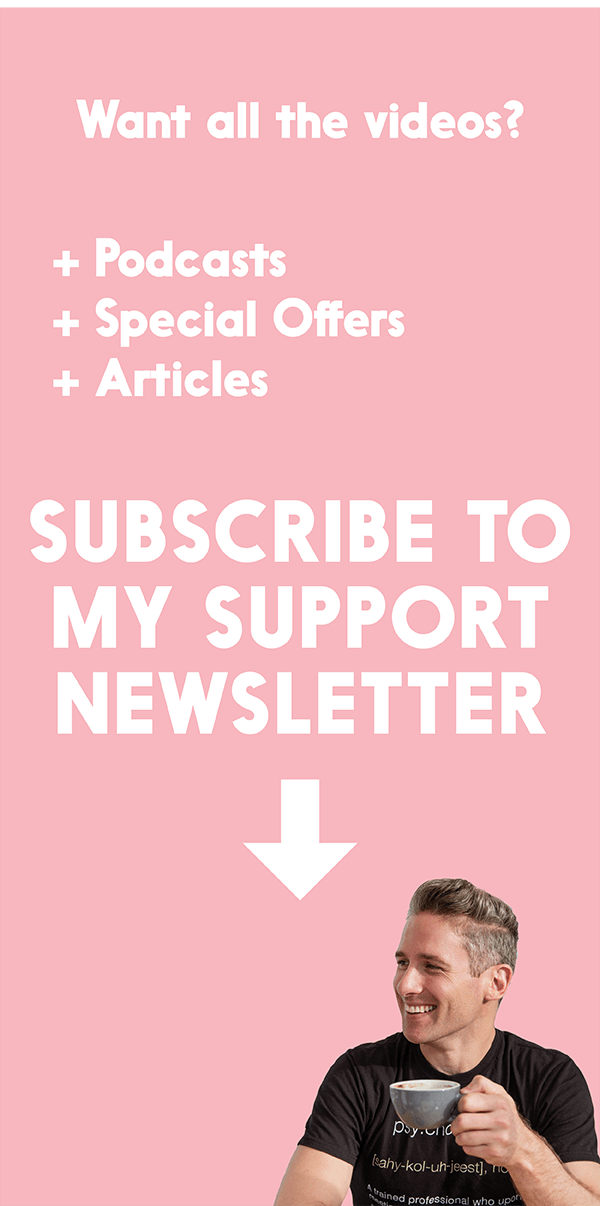
We live in a society where MOST people don’t like their bodies, and body-image issues are affecting day-to-day our lives, leading to disordered eating, mental health conditions, and reduced quality of life. So, in a weight-bias culture that idealises the thin ideal, how do we learn to love our bodies?
In this powerful 10-minute interview The Fitness Dietitian Leanne Ward and I answer Gigi’s question – “How do I learn to love my body?”, discussing:
✔︎ Why most people in today’s society don’t like their bodies
✔︎ Body positivity being like learning a new language
✔︎ A common misinterpretation about improving your body-image
✔︎ The first step to becoming authentically body-positive
✔︎ Why weight is the only remaining “socially acceptable” stigma
✔︎ How do circumnavigate the biggest cause of body-image problems
✔︎ How seeing thousands of thin images actually distorts your visual field
✔︎ Our favourite body-positive advocates to follow!
Watch Video
I created this video for people just like you.
If you found it valuable, please help me share it with them!
Links from Video:
Follow Leanne on Insta & FB
Follow Taryn Brumfitt on Insta & FB
Follow Louise Green on Insta & FB
Follow Chelsea Miller on Insta
I hope you enjoyed the video, and would love you to try the “social media spring clean” we talk about – it’s how I often start body-image work with clients, and it’s a very powerful first step to authentic body-positivity!
TRANSCRIPT
Leanne: Gigi wants to know, how do I learn to love my body? Great question there.
Glenn: Great question and great named Gigi.
Leanne: Awesome name.
Glenn: We love your name. Okay, let’s get to what you actually want from us. The first thing I would say is, and I think this is a really important point is that I once heard body positivity being described as like learning a new language. So Gigi and everybody else out there that’s watching because chances are, this video is relevant to you.
Leanne: Yeah.
Glenn: We find that psychologists talk about a normative discontent with our bodies.
Leanne: Yes.
Glenn: And that means it’s actually normal to not feel comfortable in the skin that you’re in.
Leanne: Yeah.
Glenn: And that is independent of what you look like. So I see people in my office that might weigh 250 kilogrammes who don’t feel great about their bodies, and people in my office who weigh 45 kilogrammes and don’t feel really good in their body. So yeah body image is really up here, not out here. Any tips that we can give today will really be starting you off on that journey of learning the language of body positivity.
My best tip is to start to buy out of society’s messages. We live in a culture where I believe that weight and appearance is the only remaining socially acceptable stigma.
Leanne: Yeah.
Glenn: It’s not okay in our society to be racist anymore. It’s not okay. Society has said, even more recently in Australia, it’s not okay to be homophobic. We don’t accept that. But I still think it’s okay to be fat phobic.
Leanne: Yeah. Unfortunately it still exists.
Glenn: Yeah, absolutely. And so I think that to become authentically body positive, and really, truly comfortable in your own skin, the first step that I always do with people starting to declutter all of the thin ideal messages that you get.
Leanne: Yes.
Glenn: Because it’s so interesting in psychology, there’s often so many different factors that cause one particular issue. But in body image, it’s really weird. It’s one of those very rare instances where it’s the one big thing it just kind of every bit of research just shines towards one thing and it’s that thin ideal image.
Leanne: Exactly.
Glenn: What we want to do is when I’m working with a client, we declutter all of their Facebook. All of their Instagram, all of their email subscription, Snapchat, everything. And we look at where they’re getting messages, where they’re either comparing themselves to a thin ideal. And often if you do this yourself, which I would love you to do, you’re going to end up unfollowing a lot of people. Anything that’s trying to sell you weight loss or beauty products. Anything, even if it’s your friends that make you feel a bit less than. Because what we know is that seeing these this ideal messages repeatedly, actually warps your perception of yourself.
Not even the way that you just feel about yourself, but actually what you see when you look in the mirror. You train yourself, kind of like a-
Leanne: That body dysmorphia even a little bit, yeah.
Glenn: It’s like a show version of body dysmorphia. And body dysmorphia, only a small percentage of the population had that. That’s what we call the disease of imagined ugliness where you look just fine or normal but feel like you look extremely unattractive. But more worrying is just that general like a subclinical body image issues. And we all have a dose of this, even if we don’t have the full blown thing.
Leanne: Yeah.
Glenn: And then I think your mind hate a vacuum. So we don’t want to just take away all of those messages. We want to start to learn that language of body positivity and have some really good body positive follows.
Leanne: Yeah, great.
Glenn: Then start to fill your social media, fill your mind with a diversity of shapes and sizes.
Leanne: Great, yeah.
Glenn: Because that’s what we say in real life.
Leanne: Yep, definitely.
Glenn: If you look at the movies or if we look at Instagram, or if we watch magazines, we just see one image.
Leanne: Yeah, great.
Glenn: But if we look at real life, we see diversity of shapes and sizes and we say positive messages around those. So you had a really good book positive follow. What was her name?
Leanne: Yeah. Chelsea King.
Glenn: Chelsea King. Okay, so that’s a good one. I really like Louise Green. They call her Big Fit girl. So you can follow her on Instagram.
Leanne: Yep. Wonderful.
Glenn: And our friend from Australia of [inaudible 00:05:17] is fantastic. [crosstalk 00:05:18]. But you will find that it is like, delving into a whole new world.
Leanne: Yeah. So if you’re scrolling through your feed and all you’re saying is perfect girls throughout your feed, you automatically think that I’m not good enough. So what you’re saying is get rid of those people unfollow them if you have to, and start following people who make you think that you are enough. You might even be following companies that try to sell you things. They’re trying to sell you fat burners and protein powders and even just these jeans that pull your waist in. They’re effectively trying to say you’re not good enough. You need to buy my product.
Glenn: And it’s an extremely crude but an amazingly powerful marketing technique. And it’s really like a three step process. Show you the thin, ideal image. That creates a negative comparison. And then they sell you the answer, which only doesn’t work.
Leanne: You think that you can become this beautiful, rich, skinny, et cetera, if you have their product. And there’s a reason that they use beautiful slim models to sell their products.
Glenn: And the thing is that you and I both know and Leanne, you even post about this on your Instagram. Is that even the models don’t look like that.
Leanne: Yeah, I do a lot of comparison photos. Yeah, just to show you guys that what you see on Instagram isn’t necessarily always real life. It’s a perfectly edited highlight real. And I say it again and again and again. It’s like a photo album. You wouldn’t put a shitty photo of yourself in your photo album for everyone to see when they come over to your house and they look through your photos. You post that one amazing image that you nailed in the moment. But even in today’s society, we take it one step further. We might edit ourselves. We want to put a filter on ourselves.
Some people might even smooth out their [inaudible 00:07:03] or get rid of a mole on their face. With the power of Photoshop these days, the images that we’re seeing, especially online, are never what reality shows us in real life. And if we’re constantly seeing those images, we’re constantly getting those messages that were not good enough.
Glenn: Yep. And even, and I think you raise a really good point Leanne. Because even if you can consciously recognise, we call this media literacy. If you can recognise, oh, that’s probably Photoshoped or that’s not real. That’s really positive, because we can’t avoid saying these messages altogether. But it’s like you said, as soon as you see the image, that image goes into your unconscious mind, you can’t unsee it. So the best solution is actually to minimise your exposure to these images as much as you can.
Leanne: Yeah.
Glenn: Look, you know what, I think that’s a really good place to finish up.
Leanne: Yeah.
Glenn: Because we don’t want to give you a million ideas on body positivity and like we said, it is like learning a new language. So it is going to take you quite a while. But if you do this one step, you will absolutely be surprised.





